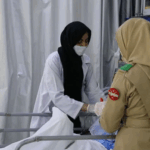Lymphoedema, a chronic and incurable condition causing painful swelling, is becoming an increasingly recognized issue among cancer patients, yet it remains largely overlooked in medical circles. While cancer treatments such as surgery and radiotherapy can leave patients with this debilitating condition, the lack of awareness and proper care continues to cause significant hardship for sufferers.
Lymphoedema occurs when the lymphatic system, responsible for draining excess fluid from tissues, is damaged or impaired. This can result from cancer treatments, such as the removal or damage of lymph nodes, or even due to genetic factors, infection, or injury. In the UK alone, approximately 450,000 people live with lymphoedema, with 10 million affected in the United States. The condition is also prevalent in patients undergoing cancer treatments, such as breast and prostate cancer. For example, one in five women treated for breast cancer will develop lymphoedema.
Despite its prevalence, lymphoedema remains a largely neglected condition, often dismissed by doctors. One personal account shared by a patient’s relative recounts how a doctor dismissed the pain and discomfort of lymphoedema as “nothing we can do about that,” despite the patient’s legs swelling to nearly three times their normal size. This lack of empathy and treatment options is a common frustration among patients.
Kimberley Steele, former bariatric surgeon and lymphatic research program manager at ARPA-H, described the lymphatic system as a vital yet often overlooked network. “It permeates every organ and tissue, and as surgeons, we can’t see it because the lymphatic vessels are translucent. It’s not until you are really affected that you appreciate how much it does for you,” she explained.
Lymphoedema patients face not only physical pain but also psychological and socioeconomic consequences. The swelling, which can lead to loss of mobility and independence, often results in depression and reduced quality of life. While the condition is manageable through daily care, such as compression garments and lymphatic massage, access to these services is limited. A lack of specialized professionals and underfunding of lymphoedema care means many patients cannot get the support they need.
Matt Hazledine, a lymphoedema advocate, developed the condition after a severe infection, which caused his leg to swell by 60%. He shared how difficult it was to manage without proper treatment: “It was like wading through thick treacle in the fog.” Patients like Hazledine and others have often expressed that they find lymphoedema to be a greater challenge than the cancer itself, as the condition serves as a constant reminder of their battle with the disease.
Doctors and advocates alike are calling for greater awareness and specialized care for lymphoedema, emphasizing the need for more research, funding, and treatment options. Without increased attention, many sufferers will continue to face lifelong struggles with this hidden, yet widespread condition.
















